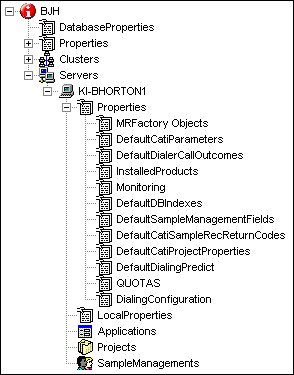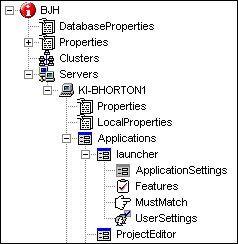Server properties
Each server in a cluster has its own set of default properties. These are as follows.
Properties
A collection that contains the same properties as the site-level Properties collection, usually with the same values.
For more information, see
Site properties.
LocalProperties
Properties that are unique to the current server. There are no local properties in the current version.
Applications
Holds a property collection for each UNICOM Intelligence Interviewer - Server Admin activity. If UNICOM Intelligence Interviewer - Server Admin is installed, there will also be property collections for its activities, and if UNICOM Intelligence Reporter is installed there will be a single property collection for that too. The property collections are named with the internal names of each activity rather than the names that are displayed in UNICOM Intelligence Interviewer - Server Admin so, for example, the property collection for UNICOM Intelligence Interviewer - Server Admin itself is called "launcher".
These property collections consist of four properties (Created, Creator, Owner, and Roles) plus property collections related to sections in the activities' interface (.xml) files. The values of the four top-level properties are set when the activity is installed, and only Roles should be changed after installation. This shows which roles have access to an activity. The usual way to change this property is by using the User Administration activity in UNICOM Intelligence Interviewer - Server Admin.
The values of all properties in the sub-collections are read from
.xml files and can be changed using DPM Explorer or by editing the appropriate file. For more information, see
Activity interface documents.
Changing these properties using DPM Explorer does not update the .xml files.
Projects
A collection of properties related to projects on the server. For more information, see
Project properties.
SampleManagements
A collection of properties related to sample management objects on the server. Each project that uses sample management has its own sample management object. For more information, see
Sample management properties.
See
See also


